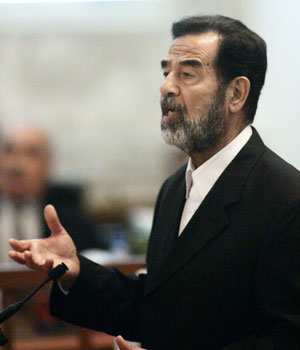
Former Iraqi President, Saddam Hussein testifies during his trial held in Baghdad’s heavily fortified Green Zone, May 24, 2006 in Baghdad, Iraq (AP)
BAGHDAD,(Reuters) – Iraq’s former Deputy Prime Minister Tareq Aziz made his first public appearance in three years on the stand for Saddam Hussein on Wednesday and said the court should try today’s Iraqi leaders for attacks in the 1980s.
Aziz, the highest profile witness for Saddam, was once the international public face of the toppled leader’s government and one of his closest aides. He tried to turn the tables in the trial by accusing one of the parties now in power, the Islamist Shi’ite Dawa, of trying to kill him and Saddam in the 1980s.
“I’m a victim of criminal acts committed by a party presently in power now. Try them,” said Aziz, referring to a hand grenade attack at a Baghdad university in 1980.
Another former top official, Saddam’s personal secretary Abed Hamid, also took the stand during Wednesday’s session.
Saddam and seven co-defendants are accused of bloody reprisals, including the killings of 148 Shi’ites, in the town of Dujail after a failed assassination attempt on Saddam in 1982 by the Dawa party of Iraqi Prime Minister Nuri al-Maliki.
Aziz, a long-time ally of Saddam, said the assassination attempt in Dujail was part of a series of operations targeting officials and civilians and Iraqi officials had every right to crack down on the Dawa.
“Weren’t the killings at Mustansiriya University a mass killing?,” Aziz asked the court. “And now you are judging officials, accusing them of mass killings.”
Aziz, whose family says he is seriously ill, was number 43 on the U.S. most-wanted list of Iraqi officials when he gave himself up in April 2003.
He featured prominently in all three of Iraq’s wars, garnering American support in the 1980-88 war with Iran before turning into a foe in the later Gulf conflicts.
Sharp exchanges erupted between judge Raouf Abdel-Rahman and Saddam and his half brother Barzan al-Tikriti shortly after the chamber opened.
Saddam, who still calls himself the president of Iraq, barked at the judge: “You elected me.”
All the defendants, including Saddam, were present when Wednesday’s session got under way.
With his eloquent English, Aziz came to prominence in the world media after Saddam’s invasion of Kuwait in 1990, often confidently smoking a cigar in news conferences as he explained Iraq’s positions through years of confrontations.
Appearing noticeably thinner in pyjamas in court, Aziz tried to undermine the Dujail case as the judge told Saddam’s chief lawyer to stop challenging the court.
Aziz argued Saddam’s government was entitled by law to punish groups which killed officials and civilians.

German Foreign Minister Frank-Walter Steinmeier kicks a football at the Prince Faisal Bin Fahd olypmic complex in Riyadh yesterday during his visit to Saudi Arabia (Photo by Iqbal Hussein)

Tariq Aziz, former Iraqi deputy prime minister sits in front of an Iraqi judge during his initial interview at an undisclosed location in Baghdad, in July 2004 (AFP)
